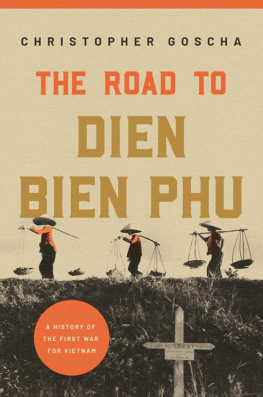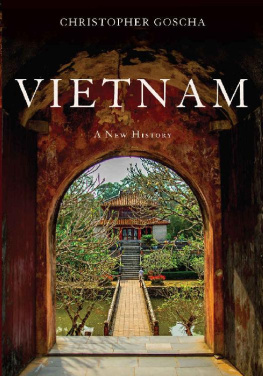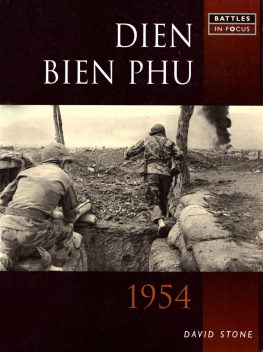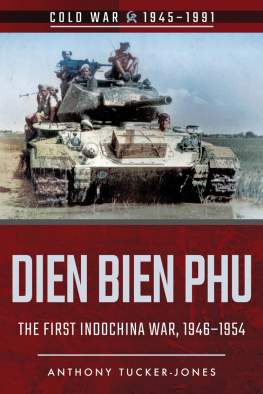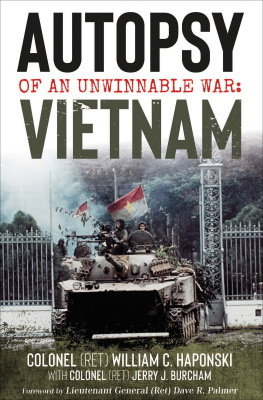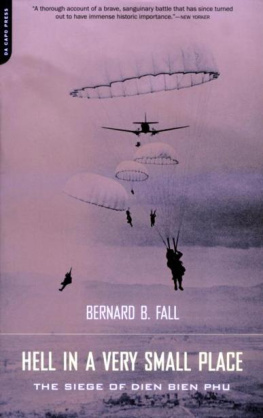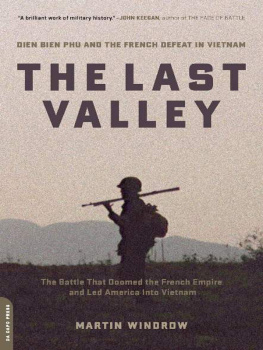THE ROAD TO DIEN BIEN PHU
THE ROAD TO
DIEN BIEN PHU
A HISTORY OF THE FIRST WAR FOR VIETNAM
CHRISTOPHER GOSCHA
PRINCETON UNIVERSITY PRESS
PRINCETON & OXFORD
Copyright 2022 by Princeton University Press
Princeton University Press is committed to the protection of copyright and the intellectual property our authors entrust to us. Copyright promotes the progress and integrity of knowledge. Thank you for supporting free speech and the global exchange of ideas by purchasing an authorized edition of this book. If you wish to reproduce or distribute any part of it in any form, please obtain permission.
Requests for permission to reproduce material from this work should be sent to
Published by Princeton University Press
41 William Street, Princeton, New Jersey 08540
6 Oxford Street, Woodstock, Oxfordshire OX20 1TR
press.princeton.edu
All Rights Reserved
Library of Congress Cataloging-in-Publication Data
Names: Goscha, Christopher E., author.
Title: The road to Dien Bien Phu : a history of the first war for Vietnam / Christopher Goscha.
Description: Princeton : Princeton University Press, 2022. | Includes bibliographical references and index.
Identifiers: LCCN 2021010045 (print) | LCCN 2021010046 (ebook) | ISBN 9780691180168 (hardback) | ISBN 9780691228655 (ebook)
Subjects: LCSH: Indochinese War, 19461954. | CommunismVietnamHistory20th century. | DecolonizationVietnamHistory. | VietnamHistory, Military20th century.
Classification: LCC DS556.54 .G67 2022 (print) | LCC DS556.54 (ebook) | DDC 959.704/1dc23
LC record available at https://lccn.loc.gov/2021010045
LC ebook record available at https://lccn.loc.gov/2021010046
Version 1.0
British Library Cataloging-in-Publication Data is available
Editorial: Priya Nelson, Thalia Leaf, and Barbara Shi
Production Editorial: Kathleen Cioffi
Text Design: Karl Spurzem
Jacket Design: Faceout Studio
Production: Danielle Amatucci
Publicity: Alyssa Sanford and Carmen Jimenez
Jacket image: Werner Bischof, Vietnamese women walking along the road in front of the grave of a French soldier killed during the war, 1952, Tonkin / Magnum Photo
CONTENTS
vii
ix
xiii
A link to the online bibliography with Vietnamese diacritics can be found at www.cgoscha.uqam.ca
ACKNOWLEDGMENTS
I never realized when I first set out to write this book how difficult the task would be. Things were rarely what they appeared to be at the start. What I thought was a simple war of decolonization turned out to be a series of conflicts wrapped into one very complicated conflagration. Where I thought there were only two main actors, the French and their Vietnamese opponents led by Ho Chi Minh, there were many more. And even the Vietnam whose statecraft I thought I knew best, Hos, was not what I had initially thought it to be. To help me find my way, a group of friends, colleagues, scholars, and editors were always there to help me. Although they may not agree with the path I ended up taking to get through the forest of the first war for Vietnam, also known as the Indochina War (194554), I am deeply indebted to each of them. They took the time out of their busy schedules to read and comment on my draft chapters, shared references and ideas with me, and made invaluable suggestions for improving the book. They are: Nasir Abdoul-Carime, Pierre Asselin, Andrew Barros, Madame Bernard (chi Son), Michel Bonin, Pascal Bordeaux, the late Georges Boudarel, Mark Bradley, Raphalle Branche, Pierre Brocheux, Ivan Cadeau, Nayan Chanda, Chen Jian, Haydon Cherry, Gareth Curless, Do Kien, Doan Cam Thi Poisson, Olga Dror, Duong Van Mai Elliot, David Elliot, Max Friedman, Martin Grossheim, Franois Guillemot, Andrew Hardy, Steve Heder, Daniel Hmery, Judith Henchey, Alec Holcombe, Jim House, Talbot Imlay, Jrmy Jammes, Charles Keith, Liam Kelly, Agathe Larcher, Mark Lawrence, Antoine Le, Yuxi Liu, Henri Locard, Bruce Lockhart, Fredrik Logevall, Lorenz Lthi, Neils Macmaster, Edward Marolda, Alexis Math, Ariane Mathieu, Shawn McHale, Mark Moyar, Jeremy Murray, Nguyen Lan Binh, Nguyen Manh Hung, Phi-Van Nguyen, Nguyen Quoc Thanh, Nguyen Tung, Philippe Papin, Vatthana Pholsena, Emmanuel Poisson, Merle Pribbenow, Qiang Zhai, Sophie Quinn-Judge, Martin Rathi, Brett Reilly, Flix Rhaume, Brigitta van Rheinberg, Vronique Sales, Gerard Sasges, Ronald Spector, Balazs Szalontai, Elie Tenenbaum, Sylvie Thnault, Claire Tran Thi Lien, William Turley, Maurice Vasse, Dominique Vesin, Paul and Marie-Catherine Villatoux, Alex-Thai D. Vo, and Peter Zinoman. A special thank you to those who generously went through (or rather suffered through) all or almost all of the manuscript: Pierre Grosser, Franois Guillemot, Mark Lawrence, David Marr, Edward Miller, Edwin Moise, Martin Thomas, Stein Tonnesson, George (Jay) Veith, Tuong Vu, Edward (Ted) Walters, and Arne Westad. I also owe a special thanks to two anonymous readers who carefully went through my draft manuscript and provided incredibly helpful comments. On the equally important production side, Jeff Edwards did a brilliant job on the maps. My thanks at Princeton University Press to Eric Crahan, Thalia Leaf, Kathleen Cioffi, David Campbell, Karl Spurzem, and Priya Nelson for their excellent work in bringing this project to fruition and for putting up with me along the way. I am particularly grateful to Louisa Sladen Watson for her excellent copyediting. Her watchful eye and excellent suggestions made this a better book.
All errors, factual or interpretative, are mine alone.
Christopher Goscha
Universit du Qubec Montral
A WORD ABOUT WORDS
In the pages that follow, I will only use one name for the Vietnamese state that went to war against the French (and then against the Americans). It is the Democratic Republic of Vietnam, abbreviated as the DRV. In Vietnamese it is: Viet Nam Dan Chu Cong Hoa. This term refers to the state Ho Chi Minh declared independent on 2 September 1945 and which he led as President until an armistice was signed in Geneva on 21 July 1954, ending the fighting and my book. I do not use the term Viet Minh or the Viet Minh regime to describe this state or its activities. For one, the Viet Minh ceased to exist in early 1951, intentionally dissolved by its communist makers. That is reason enough not to use it after that date. Second, the Viet Minh was a nationalist front created in 1941, briefly a political party in 1945 and 1946, but it was never a state. To treat it as if it were is not only inaccurate; but it also prevents us from seeing a more complicated and, I believe, more interesting story of statecraft during the Indochina War, the subject of this book.
We also need to agree on the terms we use to describe what the French and their Vietnamese partners were doing. First, I use the terms French Indochina or the Indochinese federation to refer to the colonial state the French stitched back together in one form or another between 1945 and 1954. The French folded their Indochinese federation into a larger colonial entity known as the French Union, which was created in October 1946 and based out of Paris. To this, we need to add the Associated State of Vietnam. It came to life when the French finally allowed their noncommunist Vietnamese partners lined up behind the former Emperor Bao Dai to combine Cochinchina, Annam, and Tonkin (for the colonial south, center, and north) into a unified territorial state the French agreed to call Vietnam. This Vietnamese state was nevertheless part of an Indochinese ensemble known officially as the Etats associs de lIndochine or the Associated States of Indochina. It included Bao Dais Vietnam, King Sisavang Vongs Laos, and King Norodom Sihanouks Cambodia. All three states were by association part of an Indochinese federal state run by the French. It was not the State of Vietnam. It was the Associated State of Vietnam. Collectively, the Associated States of Indochina were, in turn, part of this larger imperial body administered from Paris, the French Union. The Vietnamese allied with the French knew that Association at both the Indochinese and French Union levels bound them legally to the French republic.

